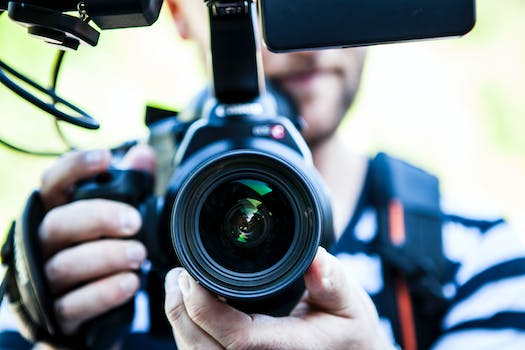- 1. Understanding the Power of Documentaries
- 1.1. The Influence of Documentaries on Society
- 1.2. The Role of Documentaries in Shaping Public Opinion
- 1.3. Documentaries as Tools for Social Change
- 1.4. Exploring the Impact of Documentaries on Viewers
- 1.5. The Documentary Genre: A Catalyst for Transformation
- 2. Challenging Perceptions: Can Documentaries Alter Reality?
- 2.1. Documentaries and the Manipulation of Truth
- 2.2. The Ethics of Documentary Filmmaking
- 2.3. Documentaries as a Reflection of the Filmmaker’s Bias
- 2.4. Unveiling the Agenda: Hidden Motives in Documentaries
- 2.5. The Power of Editing: How Documentaries Shape Narratives
- 3. Unveiling the Hidden Truth: Can Documentaries Change Perspectives?
1. Understanding the Power of Documentaries
Documentaries have the extraordinary ability to shed light on hidden truths and challenge our perspectives on the world. They have the power to captivate audiences and provoke thought-provoking discussions. One of the most compelling aspects of documentaries is their ability to present real-life events and experiences, offering a glimpse into different cultures, social issues, and historical events. By delving deep into various subjects, documentaries can educate, inform, and even inspire viewers to take action. In a world where we are constantly bombarded with information, documentaries provide a unique platform for in-depth exploration and understanding. The documentary genre has the potential to change the way we see the world by presenting alternative narratives and exposing us to new ideas and perspectives.
1.1. The Influence of Documentaries on Society
Documentaries have a profound influence on society, shaping the way we perceive the world and challenging our preconceived notions. These thought-provoking films have the power to captivate audiences and spark conversations that can lead to social change. By shedding light on important issues and exposing hidden truths, documentaries have the potential to alter our perspectives and challenge the status quo.
One of the key questions that arises when exploring the impact of documentaries is, ‘Can the documentary change the way we see the world?’ The answer is a resounding yes. Documentaries have the ability to provide a fresh lens through which we can view the complexities of our society. They offer a glimpse into different cultures, untold stories, and controversial topics that might otherwise go unnoticed.
Through compelling storytelling and compelling visuals, documentaries have the power to evoke empathy and inspire action. They can bring attention to social injustices, environmental crises, political corruption, and various other issues that demand our attention. By presenting real-life narratives and presenting factual evidence, documentaries challenge our existing beliefs and encourage us to reevaluate our perspectives.
Furthermore, documentaries have the potential to create a ripple effect within society. When a documentary resonates with viewers, it often leads to discussions, debates, and a call for change. Social media platforms and online communities provide a space for individuals to share their thoughts and opinions, amplifying the impact of these films. Documentaries can mobilize communities, raise awareness, and even influence policy decisions.
In conclusion, the influence of documentaries on society cannot be underestimated. They possess the power to educate, inspire, and transform our understanding of the world. As viewers, we must recognize the potential of documentaries to challenge our beliefs, foster empathy, and drive positive change. So, the next time you ask yourself, ‘Can the documentary change the way we see the world?’ remember that it has the potential to do so much more.
1.2. The Role of Documentaries in Shaping Public Opinion
Documentaries have the unique ability to shape public opinion and challenge the way we see the world. These thought-provoking films have the power to shed light on hidden truths and expose untold stories. By presenting facts, interviews, and real-life experiences, documentaries can influence how people perceive certain issues and events. They provide a platform for marginalized voices, highlighting social injustices, environmental concerns, political controversies, and more. Can the documentary truly change the way we see the world? Let’s delve deeper into the role of documentaries in shaping public opinion.
1.4. Exploring the Impact of Documentaries on Viewers
Documentaries have a profound impact on viewers, often challenging their perspectives and altering the way they see the world. These powerful films delve deep into various subjects, shedding light on hidden truths and presenting information in a compelling manner. Through the medium of documentaries, viewers are exposed to real-life stories, social issues, and global problems that they may not have otherwise been aware of.
One of the key aspects of documentaries is their ability to provoke thought and spark conversations. They have the potential to change viewers’ perceptions and challenge their preconceived notions. By presenting facts, interviews, and evidence, documentaries can provide a comprehensive understanding of complex topics and encourage viewers to reevaluate their beliefs.
Furthermore, documentaries often serve as a catalyst for social change. They have the power to bring attention to pressing issues and inspire action. Through their ability to evoke emotions and create empathy, documentaries can motivate individuals to get involved, support causes, or even initiate movements.
In today’s digital age, documentaries have become more accessible than ever before. With streaming platforms and online distribution channels, viewers can easily find and watch documentaries from all around the world. This accessibility has further amplified their impact, reaching a wider audience and fostering greater awareness.
In conclusion, documentaries play a crucial role in shaping the way we see the world. They have the potential to inform, educate, and inspire change. By highlighting important issues and challenging societal norms, documentaries can truly transform the perspectives of viewers and contribute to a more informed and empathetic society.
1.5. The Documentary Genre: A Catalyst for Transformation
Documentaries have the power to transform our perspectives and challenge the way we see the world. With their unique ability to uncover hidden truths, documentaries have become a catalyst for change. Through thought-provoking storytelling and compelling visuals, they shed light on important issues and spark conversations that can lead to real transformation.
The documentary genre has evolved over the years, encompassing a wide range of subjects and styles. From political exposés to environmental documentaries, there seems to be no limit to the topics that can be explored through this medium. This diversity allows documentaries to reach a broad audience and engage viewers from all walks of life.
One of the key strengths of documentaries is their ability to present factual information in an engaging and accessible manner. By combining interviews, archival footage, and expert analysis, documentaries provide viewers with a comprehensive understanding of complex topics. This immersive experience often leads to a deeper connection and empathy towards the subject matter.
Furthermore, documentaries have the power to challenge preconceived notions and inspire critical thinking. They encourage viewers to question their beliefs and examine the world from different perspectives. Whether it’s exposing social injustices or shedding light on untold stories, documentaries have the potential to ignite a desire for change.
In conclusion, documentaries have emerged as a powerful tool for transforming how we perceive the world. Through their ability to reveal hidden truths and provoke meaningful conversations, they can indeed change the way we see and understand the complex issues of our time.
2. Challenging Perceptions: Can Documentaries Alter Reality?
Documentaries have the unique power to challenge our perceptions and potentially alter our understanding of reality. These thought-provoking films aim to shed light on hidden truths, bringing to the forefront issues and stories that may have been overlooked or intentionally hidden from public view. By presenting factual information in a compelling and visually engaging manner, documentaries have the ability to captivate audiences and spark meaningful conversations.
One might wonder, can a documentary truly change the way we see the world? The answer lies in the potential impact these films can have on our thoughts, beliefs, and actions. Through their thoughtfully crafted narratives and persuasive storytelling techniques, documentaries can challenge preconceived notions, debunk myths, and provide new perspectives on a wide range of subjects.
By immersing viewers in unfamiliar environments and exposing them to different points of view, documentaries can broaden horizons and foster empathy. They allow us to witness the experiences of others, whether it be the struggles of marginalized communities, the effects of climate change, or the consequences of political decisions. Through this immersive experience, documentaries have the power to evoke emotional responses and create lasting impressions.
However, it is important to acknowledge that while documentaries can present a version of reality, they are still subject to bias and manipulation. Filmmakers have the ability to shape the narrative and selectively present information, influencing viewers’ perceptions. This raises ethical considerations and the need for critical thinking when consuming documentaries.
In conclusion, documentaries have the potential to challenge our perceptions and alter our understanding of reality. They serve as powerful tools for exposing hidden truths and promoting social change. However, it is crucial to approach documentaries with a critical eye, recognizing their ability to shape narratives and understanding the inherent biases that may be present. Ultimately, the impact of a documentary lies in the hands of its viewers, who must actively engage with the content and question the presented information to form their own informed opinions.
2.1. Documentaries and the Manipulation of Truth
Documentaries have long been regarded as a powerful medium for presenting information and shedding light on various aspects of reality. However, there is an ongoing debate about the extent to which documentaries can manipulate the truth and alter our perceptions of the world. Can the documentary truly change the way we see reality?
In recent years, there have been numerous instances where documentaries have been accused of distorting facts or selectively presenting information to fit a particular narrative. This manipulation of truth raises significant questions about the credibility and objectivity of these films. While documentaries aim to present real-life events and issues, the way in which they are edited, narrated, and framed can greatly influence the audience’s understanding and interpretation.
One of the key ways in which documentaries manipulate truth is through the use of editing techniques. Filmmakers have the power to shape the narrative by selectively including or excluding certain scenes or interviews. By carefully arranging footage and interviews, they can create a specific storyline or argument that may not necessarily reflect the complete truth. This manipulation of editing allows documentaries to present a distorted version of reality that aligns with their intended message.
Additionally, the role of the filmmaker as a narrator also plays a crucial part in shaping perceptions. The filmmaker’s voice-over, commentary, and choice of words can sway the audience’s emotions and opinions. Through persuasive storytelling techniques, documentaries can evoke certain emotional responses, leading viewers to adopt a particular viewpoint or belief. This subjective portrayal of reality can lead to a biased understanding of the subject matter.
Furthermore, documentaries often rely on the use of visuals and aesthetics to enhance their impact. Through the careful selection of images, music, and cinematography, filmmakers can create a specific atmosphere or mood that influences the audience’s perception of the truth. By manipulating the visual elements, documentaries can create a sense of authenticity or urgency, further blurring the line between reality and fiction.
However, it is important to note that not all documentaries are intentionally manipulative. Many filmmakers strive to present a balanced and objective account of the truth, aiming to educate and inform rather than manipulate. The power of documentaries lies in their ability to shed light on important issues, challenge conventional wisdom, and encourage critical thinking.
In conclusion, while documentaries have the potential to alter our perceptions of reality, it is crucial to approach them with a critical mindset. The manipulation of truth through editing techniques, subjective narration, and visual aesthetics can distort the reality presented in these films. As viewers, we must remain vigilant and actively question the information presented to us, allowing documentaries to serve as catalysts for critical thinking and exploration of different perspectives.
2.2. The Ethics of Documentary Filmmaking
Documentary filmmaking carries with it a significant ethical responsibility. As filmmakers, they have the power to shape and alter reality through their storytelling. The question arises: can documentaries truly challenge our perceptions and change the way we see the world?
One of the main goals of documentary filmmaking is to uncover hidden truths and shed light on important issues. By presenting real-life stories and events, documentaries have the potential to expose viewers to new perspectives and challenge preconceived notions. They can provide a platform for marginalized voices, sparking conversations and raising awareness about social, political, and environmental issues.
However, the ethics of documentary filmmaking come into play when considering the extent to which reality can be manipulated. Filmmakers have the ability to selectively present information, manipulate footage, and shape narratives to convey a particular message or agenda. This raises concerns about the authenticity and objectivity of documentaries.
While documentaries aim to portray reality, it is important to recognize that they are still subjective interpretations of the world. Filmmakers make deliberate choices about what to include or exclude, how to frame scenes, and which interviews to feature. These decisions can influence the audience’s perception and understanding of the subject matter.
Additionally, the impact of documentaries on viewers can vary. Some individuals may be deeply moved and inspired by a documentary, prompting them to take action or reconsider their beliefs. Others may remain skeptical or unaffected. The power of documentaries lies in their ability to spark discussions and encourage critical thinking, but ultimately, the extent to which they can alter reality depends on the viewer’s willingness to engage and be receptive to new ideas.
In conclusion, documentaries have the potential to challenge perceptions and change the way we see the world. They serve as a powerful medium for exploring important issues and exposing hidden truths. However, it is crucial to approach documentaries with a critical eye, recognizing the inherent subjectivity and potential ethical implications. Can documentaries truly alter reality? The answer lies in the hands of the viewers, who must actively engage with the content and be open to having their perspectives challenged.
2.3. Documentaries as a Reflection of the Filmmaker’s Bias
Documentaries as a Reflection of the Filmmaker’s Bias
Documentaries, often hailed as a medium for presenting objective truths, can actually be a reflection of the filmmaker’s bias. While documentaries aim to shed light on real-life events and issues, it is important to acknowledge that the selection of footage, interviews, and editing techniques can influence the way the audience perceives reality.
Challenging Perceptions: Can Documentaries Alter Reality?
One of the most intriguing aspects of documentaries is their potential to alter the way we see the world. By presenting alternative perspectives, questioning societal norms, and challenging established beliefs, documentaries have the power to challenge our perceptions and broaden our understanding of various subjects. However, it is essential to approach documentaries with a critical eye, as they can also manipulate reality to fit the filmmaker’s agenda.
The Impact of Documentaries on Society
Documentaries have the ability to spark conversations, create awareness, and incite social change. They serve as a platform for marginalized voices and can bring attention to pressing issues that often go unnoticed. The use of compelling storytelling techniques, combined with extensive research and factual evidence, can make documentaries a powerful tool for shaping public opinion and influencing societal norms.
The Limitations of Documentaries
While documentaries can be transformative, it is important to recognize their limitations. Filmmakers have the power to control the narrative and selectively present information to support their viewpoint. This can result in a skewed representation of reality, perpetuating stereotypes or omitting crucial facts. Therefore, viewers should approach documentaries with caution and seek multiple sources of information to form a well-rounded understanding.
Conclusion
In conclusion, documentaries have the potential to change the way we see the world by challenging our perceptions and shedding light on important issues. However, it is crucial to remain aware of the filmmaker’s bias and the limitations of the medium. By critically analyzing documentaries and seeking diverse perspectives, we can navigate the complex landscape of non-fiction filmmaking and uncover the hidden truths that lie within.
2.5. The Power of Editing: How Documentaries Shape Narratives
Documentaries have a unique power to shape narratives and challenge our perceptions of reality. Through the process of editing, these films have the ability to present a particular viewpoint or message to the audience. By carefully selecting footage, arranging scenes, and incorporating interviews, documentarians can create a compelling story that can alter the way we see the world.
The power of editing in documentaries lies in its ability to manipulate raw footage into a coherent and impactful narrative. Documentarians have the freedom to choose which moments to include or exclude, which angles to focus on, and how to sequence the scenes. This allows them to influence the viewer’s understanding and interpretation of the subject matter.
Challenging perceptions is a central goal of many documentaries. By presenting alternative viewpoints or shedding light on lesser-known aspects of a topic, these films can challenge preconceived notions and broaden our understanding. Documentaries have the potential to confront societal biases, expose injustices, and provoke critical thinking. They can spark conversations and inspire action, ultimately leading to a shift in our collective consciousness.
The documentary’s ability to alter reality is a complex and controversial topic. While documentaries are based on real events and people, the editing process introduces subjective decisions that can shape the narrative in a specific way. This can lead to a distortion of reality or the creation of a biased portrayal. However, when done ethically and transparently, documentaries can provide valuable insights and promote a deeper understanding of the world.
In conclusion, the power of editing in documentaries is undeniable. Through careful selection and arrangement of footage, documentarians can shape narratives that challenge our perceptions and alter the way we see the world. By presenting alternative viewpoints and shedding light on hidden truths, documentaries have the potential to provoke thought, inspire change, and unveil the hidden realities of our society.
3.1. Documentaries as Eye-Openers: Revealing Untold Stories
Documentaries have a unique power to act as eye-openers, revealing untold stories and shedding light on hidden truths. These captivating films have the ability to change our perspectives and challenge our preconceived notions. But can a documentary truly change the way we see the world? Can it alter our beliefs, values, and understanding of various issues? In this section, we will delve into the impact of documentaries on our perception and explore whether they have the potential to unveil the hidden truth. By examining the power of documentaries, we can gain a deeper understanding of how they can shape our views and contribute to social change.
3.2. Documentaries and Empathy: Bridging the Gap
Documentaries have the power to evoke empathy and bridge the gap between different perspectives. They have the potential to change the way we see the world and challenge our preconceived notions. The question remains: can the documentary truly unveil the hidden truth and alter our perceptions?
Documentaries provide a unique platform for filmmakers to shed light on untold stories and expose the reality of various situations. Through compelling storytelling and thought-provoking visuals, documentaries have the ability to captivate audiences and take them on a journey of discovery.
By presenting real-life experiences and showcasing different viewpoints, documentaries have the potential to create empathy within viewers. They can humanize complex issues, allowing individuals to connect with the subject matter on a deeper level. Through this emotional connection, documentaries can challenge biases and stereotypes, opening up new perspectives.
Moreover, documentaries can serve as catalysts for social change. By shedding light on social injustices, environmental issues, or political controversies, they can spark conversations and inspire action. The power of the documentary lies in its ability to educate, inform, and motivate viewers to question the status quo.
However, it is essential to acknowledge that the documentary alone cannot single-handedly change perspectives. While it can provide a window into different worlds and challenge our assumptions, the ultimate impact lies in the hands of the viewer. It is up to individuals to critically analyze the information presented in documentaries and actively engage with the subject matter.
In conclusion, documentaries have the potential to unveil hidden truths and change the way we see the world. Through their ability to evoke empathy, challenge biases, and inspire action, documentaries can bridge the gap between different perspectives. However, it is important to approach documentaries with an open mind and critical thinking, as their impact ultimately depends on the viewer’s willingness to embrace new ideas and perspectives.
3.3. Documentaries as Tools of Education and Awareness
Documentaries have emerged as powerful tools of education and awareness in recent years. With their ability to present real-life stories and shed light on various issues, documentaries have the potential to change perspectives and challenge preconceived notions. One such question that arises is: Can the documentary change the way we see the world? By delving deep into untold stories, providing alternative viewpoints, and presenting facts in a compelling manner, documentaries have the capacity to unveil hidden truths and offer new perspectives. They have the potential to challenge societal norms, inspire critical thinking, and spark conversations that lead to positive change. The power of documentaries lies in their ability to capture real experiences, evoke emotions, and encourage viewers to question their beliefs. As a result, documentaries can be transformative, leaving a lasting impact on individuals and society as a whole. So, can the documentary change the way we see the world? The answer is a resounding yes.
3.4. Documentaries and Cultural Understanding
Documentaries have long been recognized as a powerful medium for promoting cultural understanding and shedding light on hidden truths. These thought-provoking films have the potential to change perspectives and challenge preconceived notions. By providing a window into different cultures, documentaries help viewers gain a deeper understanding of the world around them.
One of the key strengths of documentaries is their ability to unveil the hidden truth. Through in-depth research, interviews, and compelling storytelling, these films bring to light stories and issues that may have otherwise remained unnoticed. They go beyond the surface-level information and delve into the complexities of various subjects, offering a more comprehensive view.
Documentaries also play a crucial role in fostering empathy and promoting cross-cultural understanding. By showcasing the lives and experiences of individuals from different backgrounds, these films create a bridge between cultures. They allow viewers to walk in someone else’s shoes, gaining insights into their struggles, triumphs, and everyday realities. This exposure to diverse perspectives can help break down stereotypes and biases.
Moreover, documentaries have the power to spark conversations and ignite social change. When a documentary presents a compelling argument or highlights a pressing issue, it has the potential to mobilize viewers to take action. Whether it’s advocating for a cause, supporting a movement, or reevaluating personal beliefs, these films can inspire individuals to make a difference.
In conclusion, documentaries serve as a means to unveil hidden truths and change the way we see the world. Through their ability to promote cultural understanding, foster empathy, and inspire action, they have the potential to shape perspectives and challenge societal norms. So, can the documentary change the way we see the world? The answer is a resounding yes.





